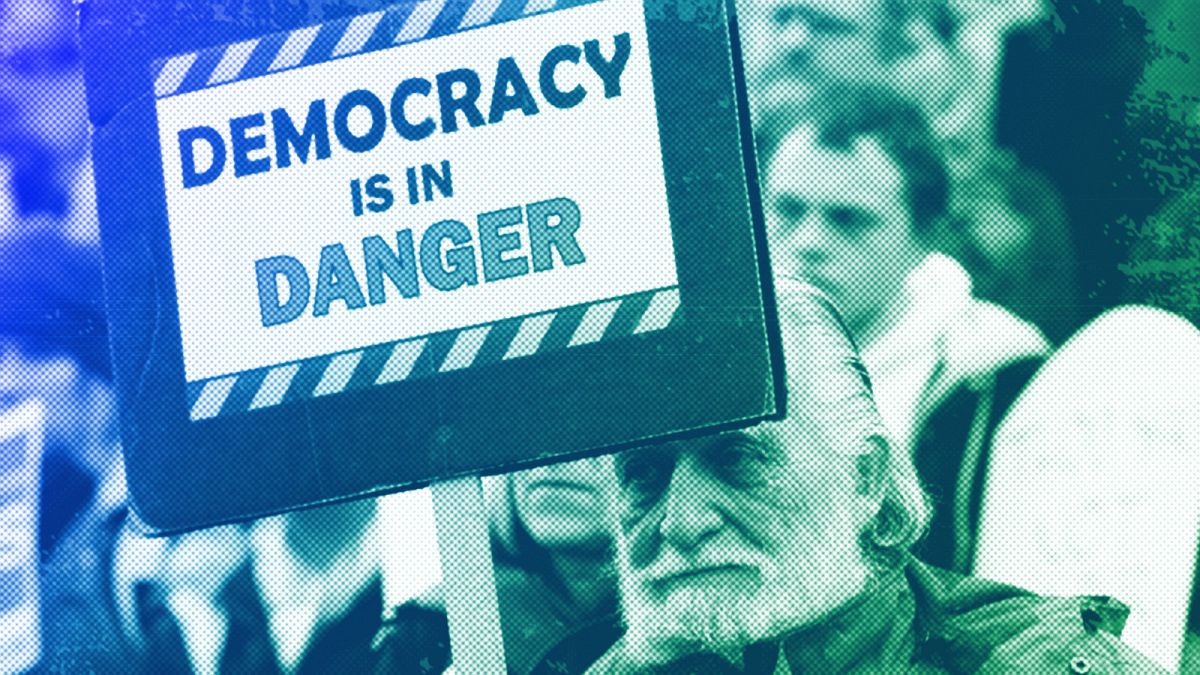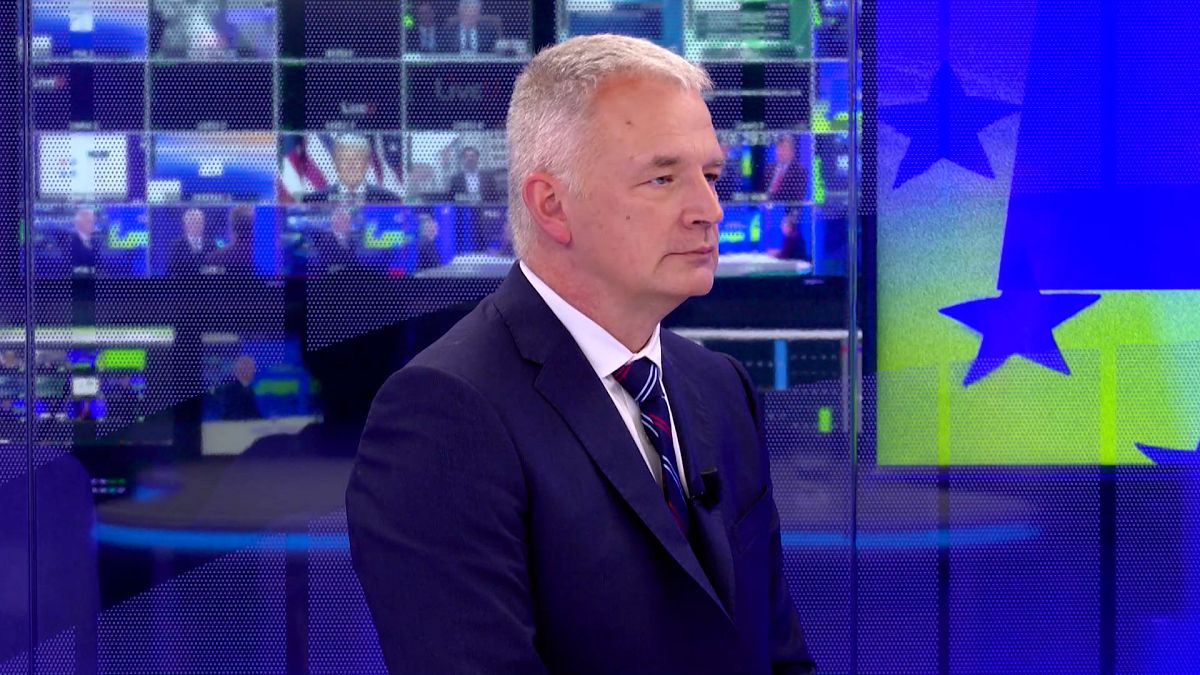Q&A: People will only use technology they trust, Microsoft expert says

The opinions expressed in this article are those of the author and do not represent in any way the editorial position of Euronews.
Euroviews spoke to Jeremy Rollison, Head of EU Policy and European Government Affairs at Microsoft Europe, about many of the burning questions around European and global regulatory cooperation on artificial intelligence, and what regulating AI will mean for Europe’s citizens.
The rise of artificial intelligence and its ever-increasing presence in our daily lives has sparked a plethora of debates.
Among those, the question of its governance has emerged as one of the most pressing issues of our time, with Brussels at the forefront of the race to regulate AI with its flagship AI Act.
However, regulation does not come without its own hurdles, and solutions are bound to determine the future of tech and Europe’s citizens alike.
At this year’s International Artificial Intelligence Summit, organised by Euronews in Brussels on 8 November, Euroviews spoke to Jeremy Rollison, Head of EU Policy and European Government Affairs at Microsoft Europe, about many of the questions around European and global regulatory cooperation, and what it will mean in practice.
Euroviews: At the Brussels Tech Forum in 2018, you named AI as one of two emerging technologies that will have the biggest impact on people and their relationship with tech. How much more is yet to come?
Jeremy Rollison: At Microsoft, we’ve been working on AI for decades. It’s already built into many of our products, and our customers use it every day.
But this year we saw AI accelerate more than ever and become mainstream with the advent of large language models and generative AI. The technology augments human abilities, and is changing everything about how we live, work and learn.
We’re seeing AI aid the research of new medicines, find solutions for accelerating the decarbonising power grids, and enhance cybersecurity.
We also see the technology driving economic growth by supporting the development of new products and services.
So we really see AI as playing a key role in helping address some of society’s most pressing challenges.
Euroviews: You often have an opportunity to talk to decision-makers about the various challenges they encounter in regulating AI. Could you share with us some of the key takeaways on what can be done and what needs to be done to ensure future-proof regulation, especially in the EU?
Jeremy Rollison: There is a balance to strike between supporting Europe’s ability to innovate while ensuring the rights and values of Europeans are protected.
Legislation is needed to get the balance right. As AI technology continues to evolve at pace, an ongoing dialogue between companies, governments, businesses, civil society and academia is important.
AI governance frameworks need to move in lockstep with technology innovation and we need diverse voices around the table to make this happen.
This is how we minimise risk and maximise opportunity, allowing for people to use the technology safely and unlocking benefits for the whole of society.
Ultimately, it’s about promoting responsible innovation of a technology that we believe will lead to huge economic growth in Europe and beyond.
Euroviews: There has been a lot of talk about future-proofing. Can we really look that far ahead?
Jeremy Rollison: We certainly should be looking ahead. The EU has ambitious plans — take the Digital Decade objectives and European Green Deal for example.
AI will play a key part in engendering this transformation including accelerating the deployment of sustainability solutions and the development of new ones — faster, cheaper, and better.
A great example is the Belgian startup BeeOdiversity which developed an AI-based system used by farmers to measure environmental impact and better protect biodiversity.
What’s important is making sure there are frameworks in place to address potential emerging risks. The pace of innovation is moving so fast and we need safety breaks built into AI systems by design.
We also need frameworks that allow us to respond to emerging challenges quickly, while ensuring the AI ecosystem can thrive and companies in Europe can adopt the technology at scale.
Euroviews: In the past, you’ve advocated for Data for All, making data available for all and not just a few, be it governments or companies, particularly in the context of AI development. How important is this access to data for AI and why?
Jeremy Rollison: Data has a key role in advancing AI technology responsibly.
The value an organisation will get from AI is largely determined by the quality of their data as well as how well governed their data are. Data is powering algorithms and enabling them to learn and make predictions.
Responsible data policies and practices for both inputs and outputs of AI models and applications allow for harnessing AI while protecting user privacy protection, safety, and security.
The growth of AI makes access to data and large language models more critical than ever. AI models can accomplish a wide variety of tasks using natural language — from drafting the first draft of a presentation to writing computer code.
In addition, AI’s ability to process large datasets and provide insights can be crucial in advancing key societal challenges, for example, accelerating progress on climate action.
AI technologies can be used to analyse energy consumption patterns and optimise the use of renewable energy sources or assist in the efficient management of natural resources and suggest conservation strategies.
Euroviews: What would be the ways to alleviate the concerns of legislators but also citizens when they hear the words “free access to data”? What can be done to assure them that their personal data is safe and will remain private?
Jeremy Rollison: People will only use technology they trust. We believe customers’ data is theirs and theirs alone.
Data processed by AI products is also subject to the GDPR as well as our customer commitments on data privacy and security that often exceed the strong data privacy laws in the EU.
Organisations large and small are deploying AI solutions because they can achieve more at scale, more easily, with the proper enterprise-level and responsible AI protections.
Customers can trust that the AI applications they deploy on our platforms meet the legal and regulatory requirements for responsible AI and that we keep their data secure.
Our mission is to empower customers to achieve more and to enable them to drive their own innovation. Their success is our success.
Source: Euro News














